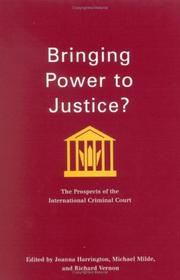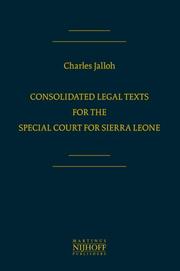| Listing 1 - 10 of 77 | << page >> |
Sort by
|
Book
ISBN: 8892160869 Year: 2016 Publisher: Turin, [Italy] : G. Giappichelli Editore,
Abstract | Keywords | Export | Availability | Bookmark
 Loading...
Loading...Choose an application
- Reference Manager
- EndNote
- RefWorks (Direct export to RefWorks)

ISBN: 0773578749 1282866311 9786612866319 0773575847 9780773575844 0773529667 9780773529663 0773529675 9780773529670 9781282866317 6612866314 9780773578746 Year: 2006 Publisher: Montreal ; Ithaca [N.Y.] : McGill-Queen's University Press,
Abstract | Keywords | Export | Availability | Bookmark
 Loading...
Loading...Choose an application
- Reference Manager
- EndNote
- RefWorks (Direct export to RefWorks)
Contributors include Dapo Akande (Oxford), Antonio Franceschet (Acadia), Tracy Isaacs (Western Ontario), Catherine Lu (McGill), Darryl Robinson (The International Criminal Court), Michael P. Scharf (Case Western Reserve School of Law), Alex Tuckness (Iowa State), and David Wippman (Cornell).
Book
ISBN: 9004304452 Year: 2016 Publisher: Leiden, Netherlands ; Boston, Massachusetts : Brill Nijhoff,
Abstract | Keywords | Export | Availability | Bookmark
 Loading...
Loading...Choose an application
- Reference Manager
- EndNote
- RefWorks (Direct export to RefWorks)
Contemporary Issues Facing the International Criminal Court is a collection of essays by prominent international criminal law commentators, responsive to questions of interest to the Office of the Prosecutor of the International Criminal Court. Topics include: • Jurisdiction: The 2008-2009 Gaza Issue • The Obligation to Arrest in the Darfur Context • Appropriate Limitations on Oversight • The ICC and Prevention of Crimes • Reparations • Proving Mass Rape • Focus on Africa: Is the ICC Biased? • Increasing Rates of Apprehension and Arrest Richard H. Steinberg is Professor of Law and Political Science at the University of California (Los Angeles), and Editor-in-Chief of www.ICCforum.com, a collaboration with the Office of the Prosecutor of the International Criminal Court. Fatou B. Bensouda, who wrote the foreword, is Prosecutor of the International Criminal Court.
Book
ISBN: 3960676794 9783960676799 3960671792 9783960671794 Year: 2017 Publisher: Hamburg Diplomica Verlag :Anchor Academic Publishing
Abstract | Keywords | Export | Availability | Bookmark
 Loading...
Loading...Choose an application
- Reference Manager
- EndNote
- RefWorks (Direct export to RefWorks)
Book
ISBN: 1282952889 9786612952883 900418967X 9789004189676 6612952881 9789004186132 9004186131 Year: 2010 Publisher: Leiden Boston Martinus Nijhoff Publishers
Abstract | Keywords | Export | Availability | Bookmark
 Loading...
Loading...Choose an application
- Reference Manager
- EndNote
- RefWorks (Direct export to RefWorks)
The Rome Statute and sequential establishment of the ICC is a milestone in the history of man. It inaugurates a new era of the supremacy of the law as the goal of humanity rendering everyone, independently of rank or position, liable for the commission of the heinous crimes within the jurisdiction of the Court; genocide, crimes against humanity, war crimes and aggression. The object is to end immunity and leave no quarter to people committing crimes that have scarred and defaced humanity. The book analyses every aspect of the Statute and supplementary instruments, eliciting the framework of it
Book
ISBN: 8491486089 9788491486084 Year: 2018 Publisher: Madrid, Spain : Dykinson,
Abstract | Keywords | Export | Availability | Bookmark
 Loading...
Loading...Choose an application
- Reference Manager
- EndNote
- RefWorks (Direct export to RefWorks)
Book
Year: 2016 Publisher: مركز الكتاب الاكاديمي
Abstract | Keywords | Export | Availability | Bookmark
 Loading...
Loading...Choose an application
- Reference Manager
- EndNote
- RefWorks (Direct export to RefWorks)
International criminal law. --- International Criminal Court.
Book
ISBN: 9781685074692 1685074693 9781685072520 Year: 2022 Publisher: Hauppauge
Abstract | Keywords | Export | Availability | Bookmark
 Loading...
Loading...Choose an application
- Reference Manager
- EndNote
- RefWorks (Direct export to RefWorks)
"For the author, a judge is a person with high ethical and moral capacity who respects their position. When we think of a court, we think about a place where we confront the truth, where every single individual, every judge and prosecutor, every victim and witness, and every accused person, offender, and the condemned, come together to reveal the naked truth. The main objective of criminal proceedings is to uphold a pure juridical system with full ethical conscience in order to protect the rights of all individuals, including members of the general public. Judges of criminal courts are required to be independent in order to pursue the truth and uphold judicial conscience, which is itself an institution based on the professional values of criminal justice. A judge with ample judicial conscience should not be afraid of being attacked or losing their position if they work to uphold and uncover the truth. This implies the independent freedom of judicial justice. If justice is safe, then the safety of the victims and the accused will also be guaranteed. That is why confidence in the professional standards of the ethical requirements of judges of national criminal courts or of the International Criminal Court is heavily contingent upon their honesty, which in turn relates to their practical experiences and ought to be based on the knowledge of the essence of humanity. Professional ethics are particularly vital when evaluating diverse values and the very question of pluralist systems of national or international criminal justice which deal with core international crimes. The intention of this work is to evaluate the way in which our administration of national and international criminal justice requires judges to be impartial, pursue the truth, and not be the puppets of politicians"--
Judicial process. --- Judicial ethics. --- International criminal courts. --- International Criminal Court.

ISBN: 1281936553 9786611936556 9047431057 9789047431053 900416183X 9789004161832 9789004161832 Year: 2007 Publisher: Leiden, the Netherlands Boston Martinus Nijhoff Publishers
Abstract | Keywords | Export | Availability | Bookmark
 Loading...
Loading...Choose an application
- Reference Manager
- EndNote
- RefWorks (Direct export to RefWorks)
The Special Court for Sierra Leone was established by a unique bilateral treaty between the United Nations and Sierra Leone in early 2002, making it the third modern ad hoc international criminal tribunal. The Special Court is currently trying nine persons, including former Liberian President Charles Ghankay Taylor, for allegedly bearing 'greatest responsibility' for serious violations of international and Sierra Leonean law that occurred after 30 November 1996. This volume presents, for the first time, a comprehensive collection of legal texts and instruments forming the normative legal framework underpinning the work of the Special Court. It fills the void for a handy sourcebook of the Special Court's primary and secondary legal texts and is intended for use primarily by the judges, lawyers, academics and other practitioners in the Special Court and other hybrid and international tribunals, including the permanent International Criminal Court.
Book
ISBN: 1847318169 1472565460 1283289512 9786613289513 1847316441 9781847316448 9781283289511 9781847318169 9781472565464 6613289515 Year: 2011 Publisher: Oxford Portland, Oregon Hart Publishing
Abstract | Keywords | Export | Availability | Bookmark
 Loading...
Loading...Choose an application
- Reference Manager
- EndNote
- RefWorks (Direct export to RefWorks)
This book deals with sentencing in international criminal law, focusing on the approach of the UN ad hoc Tribunals for the former Yugoslavia (ICTY) and Rwanda (ICTR). In contrast to sentencing in domestic jurisdictions, and in spite of its growing importance, sentencing law is a part of international criminal law that is still 'under construction' and is unregulated in many aspects. International sentencing law and practice is not yet defined by exact norms and principles and as yet there is no body of international principles concerning the determination of sentence, notwithstanding the huge volume of sentencing research and the extensive modern debate about sentencing principles. Moreover international judges receive very little guidance in sentencing matters: this contributes to inconsistencies and may increase the risk that similar cases will be sentenced in different ways. One purpose of this book is to investigate and evaluate the process of international sentencing, especially as interpreted by the ICTY and the ICTR, and to suggest a more comprehensive and coherent system of guiding principles, which will foster the development of a law of sentencing for international criminal justice. The book discusses the law and jurisprudence of the ad hoc Tribunals, and also presents an empirical analysis of influential factors and other data from ICTY and ICTR sentencing practice, thus offering quantitative support for the doctrinal analysis. This publication is one of the first to be entirely devoted to the process of sentencing in international criminal justice. The book will thus be of great interest to practitioners, academics and students of the subject
| Listing 1 - 10 of 77 | << page >> |
Sort by
|

 Search
Search Feedback
Feedback About UniCat
About UniCat  Help
Help News
News